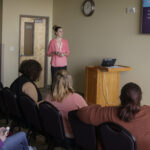
Stephanie Ladley, student at Weber State University and a nurse at Mckay Dee Hospital, is majoring in Nursing and will soon be graduating at the end of this semester. But before she walks down the aisle in cap and gown, she has to complete one final project in the honors program.
Ladley decided to collaborate with an organization on campus called Students for Choice to hold an event that addresses common misconceptions about birth control.
She said the point of the class is to “find a need in the community and do a project to helps that need.” Being a nurse, Ladley feels that birth control is something to be addressed and that many people don’t know enough about it.
Student Choice President Anne Olsen, majoring in sociology and minoring in political science, said the organization runs alongside Planned Parenthood. Olsen said their main focus is on reproductive justice.
The event that Ladley and Olsen put together was held on March 16, in the Shepherd Union at noon. The basic idea of the event was to simply address all the common misunderstandings that many people face with birth control.
“Through this event, I hope people just feel more empowered to make their own decisions surrounding reproductive health care,” said Olsen.
Ladley’s presentation covered three basic objectives. She talked about the the differences between birth control, emergency contraception and abortion. She identified the common misconceptions about birth control and emergency contraception, adding a further explain of community resources available.
Ladley explained how exactly birth control plays a role in a woman’s life.
“In the United States, about 750,000 pregnancies are unplanned,” Ladley said. According to Ladley, that is about half of the pregnancies every year. “Forty percent of those result in abortion, and so on average, a woman spends about 30 years of her life trying to not get pregnant,” she said.
Ladley further explained the two categories that birth control is divided into. She said those two groups are called barrier and hormonal birth control methods.
She said that barrier birth control consists of using condoms, withdrawal and calendar rhythm method. While hormonal birth control consists of using a pill, a patch or implants.
According to Ladley, hormonal birth control methods are found to be almost 100 percent accurate.
There are many misconceptions about using birth control, Ladley addressed many of them.
One is that you will gain weight and get acne if you take birth control. Both are false, according to Ladley. Although, she says the only birth control that research has said to cause weight gain is the depo-provera shot. All the other forms of birth control do not.
Two other misconceptions she spoke about were how both sex drive and fertility count are decreased when using birth control. Both are false, according to Ladley.
“It can take a little longer to regain your fertility, but it’s not lost,” she said.
When discussing emergency contraception or the Plan B pill, Ladley said the biggest myth is that many people believe that it’s an abortion. “All it does is stop the egg and sperm from attaching to the uterus,” Ladley said.
Once Ladley discussed the misconceptions behind birth control and emergency contraception, she touched base on abortion and the simple facts about it.
The last topic Ladley talked about was available resources, be it getting more information, getting condoms, oral contraception or emergency contraception. These resources can be accessed through Planned Parenthood, Weber State Student Health Center, James Madison Health Center and the Midtown Clinic.
Heather Downing, majoring in professional and technical writing, heard about this event through the Women’s Center where she works.
“I think Utah culture in general tends to discourage people from learning about birth control,” Downing said. “It was a good refresher on different methods.”
Olsen mentioned how barriers are not being torn down due to our justice system. She mentioned House Bill 246, a bill that was suppose grant the right for parents to allow their children to learn about sex education, even though it didn’t pass.
“It’s something that people don’t actively seek out because it’s so taboo,” Olsen said of reproductive education. “When you don’t talk about it, it leads to unplanned pregnancy.







